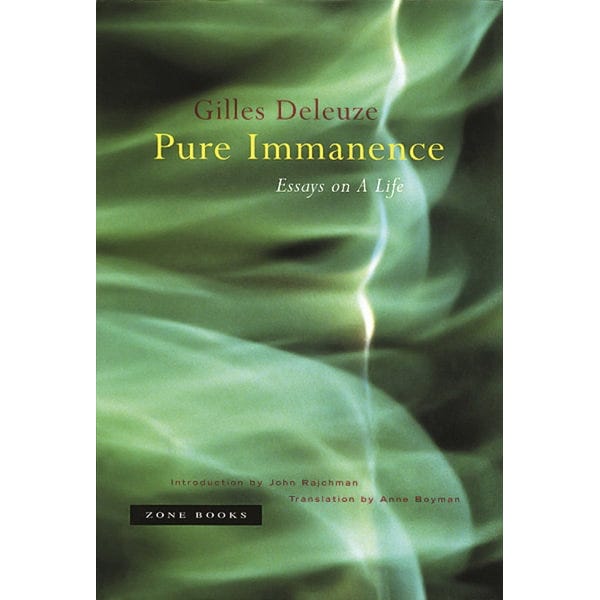Update version over at whyweshould.loofs-samorzewski.com
Reading Gilles Deleuze’s Pure Immanence: Essays on a Life. Zone Books. Cambridge, Mass: MIT. 2005. ISBN9781890951252
I’ve begun a project in which I tackle writing that I find difficult to read. This in order to write in a more understandable way. That is, to see if helps put me in their shoes.
I found this book by Deleuze on a dear friends bookshelves and thought this might be the one to do this project on, also I had not read him in a while. Of course this is in translation. I also feel I have to say that I do not read a lot of French theorists, and certainly never binge on them.
This book is small, it is composed of three essays and with an introduction by John Rajchman. The last essay, written first, is a wonderful introduction to Nietzsche. The second is a good acknowledgment of Hume in the scheme of things philosophical. The first, and last written, is where my difficulty in reading lies.
What is immanence afterall?
Immanence: a life
I have read this short essays several times in order to watch my misunderstanding and difficulties in reading it. Here watch means both guard and observe.
Of course this is relative to me, if I understand or misunderstand it is from my point of view regardless of whether others are agreed that I am mistaken in my understanding. I judge whether I get it.
After these readings I reprised my usage of words like immanence compared to those on Britannia and wikipedia. On the latter there is some linkage to Deleuze by way of his use of plane of immanence and haecceities.
Here is a possible warning, be aware and so warn others of what is my idosyncratic usage, and what is my mistaken use of others’ jargon.
These terms have a trade jargon all of their own, and each trade has their own particular forms, indeed each tradeperson may have their own particular argot.
I do not use these words immanence or haecceity very often. I feel safe, but what if I start using them?
You will notice I do not explain them here, but I do link. I link sometimes where I need to underline a point, but often just to indicate what usage patterns I am drawing one. I do this to help my readers. And if I stopped to explain every hard word I use I would never get to the end of a blog post.
That also goes for judging how many links I drop in.
As a reader I often stop my reading, when I do not understand, to look up words in dictionaries. This is easier that it was because: internet.
I drop links into my writing to help with this, even if it is just to wikipedia as a serving suggestion.
Anyway I learned that immanence is, like, the opposite to transcendence.
Pantheism views god as immanent to the universe. A more sky-fatherly deism has this god as transcendent from us, i.e. separate from and above the universe.
Anyway when I next re-read this short essay with this contradistinction newly minted in mind I found that while things were clearer, it didn’t change my understanding very much. Somehow I had got the gist by way of analogies. Yeah verily even though I had missed all this basic stuff in the opening argument.
But though I ‘got the gist’ and had bedding down my reading, I still do not feel clear. I am not happy with my understanding.
Anyway the opening sentence is :
What is a transcendental field?
So, at this point I will not explicate Deleuze’s last writing any further.
I find that my observation of my reading a difficult text has failed. I just noticed it is hard, and I cannot fake that I understand it to myself. In my notice I have a pain in my consciousness when I consider it. Thus I cannot say that I think I might understand it, it just seems hurty. Even though I perhaps understand it better, I cannot feel satisfied with my efforts.
As such this project is a failure, it does not help me get to a place where I can write better.
Two more final things things:
① I will probably keep on (re)reading this essay. I rarely put down a bone like this. At least I do not want to. Grrr.
I admit that life is too short to master all these hard texts. I may never read Kant, I may never get to Husserl, especially in the original languages. I may choose Husserl before Kant. A life’s reading is incomplete.
The fact that I will keep on reading it for a bit means I have little insight into people who do not share this habit. This may affect how I write. This goes for my dilettante moral philosophy as well as any fiction I write.
I don’t mind if you do not read it, but I do write to be read.
<hmmmm> should I link some wikipedia entry to “dilettante”ism</hmmmm>and ② I have written some “reaction video” notes or fan fiction mash-up between the written and the reader. It is put below, in response to the essay Immanence: A life. As such it’s a riff on that first line I quote above. (Doubling down on the opening line gives the title to this blog post).
What is the enemy? What field do they seek to better? What death would be fine? Death means nothing to me? What day would shine for them? What is a good day? What soul would they use to transcend with a spirit that moves like any animal here on earth?
What fables do they see in winning? What binary relationship can they enforce as a natural law, so they can win?
Where is all this coming from? Why am I here, what me-s me to I, like, I me into the enemy? Do I? Am I my own worst enemy?
So then, what me-s me to I : as if "me" was a verb 'to me' then what me-s me to I as if I knew mine enemy?
I guess, compared to Deleuze’s a life, I have a taphonomy of immanence that ignores the enemy. We’re all friends, even those who are no rhizome to me. Here we go, we break into song, but even unsung the dance will rite us again.
Other people bore me, they are not the enemy. Other people tire me, I am not transported, epiphany is circumspectly begrudged.
In good times I don’t notice I am with so many around me. Here we are, like poets in the wind.
The enemy is ripe. Listen to me I will win, didn’t I invent the game?
The enemy is full. Listen to me I can change the rules.
The enemy is strict. Be loyal and I won’t call you an enemy.
The enemy hates the world.
The world is immanent in me. The enemy only sees themselves. They are the world.
They ego the immanence, like toddlers they have no intimation of death. But in fear, the enemy in their humanity have sold their innocence for an imperial claim.
Before me when I was not me, I lived into me after thinking what came before was what exactly, but that’s not where we are going, that’s just what we doing, pretended into forever, when forever is just another day.
Immanence based discourses are lazy, the way William of Ockham’s razor is lazy.
Transcendence is a type of narcissism. Not something to be imitated.






Also, there is some anaogy here that is trying to break into my brain between the trans/immanence contradistinction or relationship, and the structure/agency confabulations we dance within with duos like credit/blame, but it does not quite arrive in mind, transcendental or not.... inchoate it arises felt but not grasped, feared but not got
okay, …we are in the middle, dancing on a threshold like Janus,
① before us is the immanent to which we are a 'transcendent field' once we are aware of 'things' enough too think like animals with subject/object tools/classes/words/grammars/recursions.
② ahead of us lies the transcendent, which is a hypothetical heaven, which is proabably more just like we are, except it hasn't happened yet... of course once it does, it is a hindsight, but creating the transcendental in the image of hindsight, this is declasse, even when it isn't idolatry.
③ thus the 'transcendantal field' is empirically available to us (its what we do, where we are) but the transcendent of this experience is not available to us and we must suspend judgement, I would argue, or turn this idol into the enemy like the enemy wants.
④ my sense of th eimmanent goes back to at least the precursors of life, I suspect Deleuze puts it closer to (self)consciouness if not at little self-consciously.